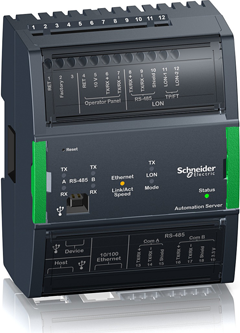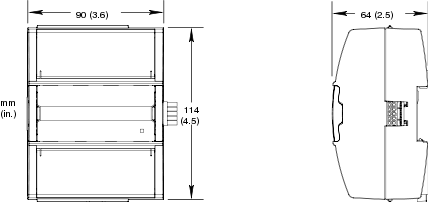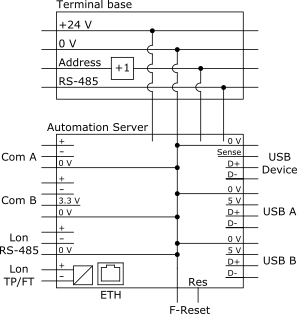
Concept
Automation Servers
An Automation Server is a Schneider Electric manufactured embedded device that generally serves as the lowest tier SmartStruxure server within the SmartStruxure solution. The Automation Server controls and supervises equipment, typically HVAC equipment. The Automation Server uses I/O modules with connected field devices, such as sensors and actuators, to do that.
Automation Server is based on the patented two-piece design. Each Automation Server consists of an electronics module and a terminal base.
The Automation Server is installed with the I/O modules on DIN rails in cabinets. The Automation Server electronics module uses a W1 enclosure. Power is supplied through the terminal base backplane.

Automation Server
Electronics Modules
The electronics module is the main component of SmartStruxure devices that are based on the patented two-piece design. The electronics module is installed on a terminal base, which constitutes the second component of the device.
For more information, see Electronics Modules .
Terminal Bases
The terminal bases are used for SmartStruxure devices that are based on the patented two-piece design. The terminal base provides the I/O bus to the electronics module installed on the terminal base as well as to the SmartStruxure device installed to the right (next terminal base in the chain).
For more information, see Terminal Bases .
Memory
The Automation Server has two types of memory:
128 MB SDRAM (for program execution)
4 GB flash (for storage)
If a power failure occurs, all important variables are automatically saved to the flash memory before complete shutdown. When power returns, this data retention function ensures that the Automation Server can continue to run with the correct set of values.
Supported Building Standards
The Automation Server natively communicates with three of the most popular communication protocols:
BACnet: The Automation Server directly communicates to BACnet/IP and BACnet MS/TP networks, which provides access to b3 devices and BACnet devices.
LonWorks: The Automation Server has a built-in FTT-10 port, which enables access to Xenta devices and LonWorks devices.
Modbus: The Automation Server natively integrates Modbus RS-485 master and slave configurations, as well as IP client and server. This integration provides access to devices that communicate on the Modbus protocol, such as power meters, circuit breakers, and lighting controllers.
Automation Server Communication Ports
The Automation Server has the following communication ports:
1 Ethernet 10/100 megabit port
2 RS-485 ports
2 LonWorks (TP/FT and RS-485) ports
2 USB host ports
1 USB device port
1 backplane I/O bus port
For more information, see Automation Server Communication Ports .
Automation Server Screw Terminals
There are 12 screw terminals at the top of the Automation Server and 3+4 pluggable screw terminals at the bottom.
For more information, see Automation Server Screw Terminals .
Automation Server LEDs
There are eight LEDs on the front panel of the Automation Server.
For more information, see Automation Server LEDs .
Reset Functions
There are three different types of reset for the SmartStruxure server devices: warm start, cold start, and DFU mode. Depending on the type of reset, the SmartStruxure server device can be reset using the reset button or a command from WorkStation.
For more information, see Reset Functions .
Communication Port Wiring
The wiring recommendations for the SmartStruxure server device communication ports apply to the wires and cables used for RS-485 communications, LonWorks communications, USB connections, and Ethernet connections. Always use the recommended cables and wires.
For more information, see Communication Port Wiring .
SmartStruxure Server Device Replacement Using Restore
Backup and Restore assures that SmartStruxure server devices data can be restored to a replacement SmartStruxure server device in the event of hardware failure, or to the same SmartStruxure server device in the event of data loss. As a precaution, you back up your SmartStruxure server devices regularly so that you can use the most current backup to restore the SmartStruxure server devices data to a replacement SmartStruxure server device. You also configure the new SmartStruxure server device to match the name and the network settings of the replaced SmartStruxure server device so the system can identify this SmartStruxure server device when online.
For more information, see SmartStruxure Server Device Replacement Using Restore .
Specifications
| Electrical | |
DC input supply power
|
7 W
|
DC input supply voltage
|
24 VDC
|
| Environment | |
Ambient temperature, operating
|
0 to 50 °C (32 to 122 °F)
|
Ambient temperature, storage
|
-20 to +70 °C (-4 to +158 °F)
|
Maximum humidity
|
95 % RH non-condensing
|
| Material | |
Plastic rating
|
UL94-5VB
|
Enclosure
|
PC/ABS
|
Enclosure rating
|
IP 20
|
| Mechanical | |
Dimensions including terminal base
|
90 W x 114 H x 64 D mm (3.6 W x 4.5 H x 2.5 D in.)
|

|
|
Weight including terminal base
|
0.294 kg (0.65 lb)
|
Weight excluding terminal base
|
0.194 kg (0.43 lb)
|
| Real-time clock backup | |
Inaccuracy, at 25 °C (77 °F)
|
-47 to +73 seconds per month
|
Backup time
|
30 days
|
| Communication ports | |
Ethernet
|
10/100BASE-TX RJ45
|
USB
|
1 device port (type-B) and 2 host ports (type-A)
|
RS-485
|
Dual 2-wire ports, bias 3.3 VDC
|
LonWorks
|
TP/FT-10
|
| Communications | |
BACnet
|
BACnet/IP and MS/TP, port configurable, default 47808
|
BTL B-BC (BACnet Building Controller)
a
|
|
BTL B-OWS (BACnet Operator Workstation)
a
|
|
| a) See the BTL Product Catalog for up-to-date details on BTL listed firmware revisions on BACnet International's home page. | |
Modbus
|
Modbus TCP, client and server
|
Serial, RS-485, master or slave
|
|
TCP
|
Binary, port fixed, 4444
|
HTTP
|
Non-binary, port configurable, default 80
|
HTTPS
|
Encrypted supporting TLS 1.2, 1.1, and 1.0, port configurable default 443
|
SMTP
|
Email sending, port configurable, default 25
|
SNMP
|
version 3
|
Network supervision using poll and trap
|
|
Application alarm distribution using trap
|
|
| LNS | |
LNS version
|
OpenLNS
|
Installed on WorkStation PC
|
|
| LonMark | |
Resource files version
|
14.00
|
| CPU | |
Frequency
|
160 MHz
|
Type
|
AT91RM9200, ARM9 core
|
SDRAM
|
128 MB
|
Flash memory
|
4 GB
|
Internal Configuration
All connectors of the Automation Server, except for the Ethernet connector, refer to signal ground as shown in the figure below.

Automation Server internal configuration
The I/O bus in the terminal base provides the Automation Server with power and an address.
The address value in the I/O bus is increased by one for each terminal base. The I/O bus also enables RS-485 communication between the I/O module and the SmartStruxure server device.
 Hardware Overview
Hardware Overview
 Electronics Modules
Electronics Modules
 Terminal Bases
Terminal Bases
 Automation Server Communication Ports
Automation Server Communication Ports
 Automation Server Screw Terminals
Automation Server Screw Terminals
 Automation Server LEDs
Automation Server LEDs
 Reset Functions
Reset Functions
 Communication Port Wiring
Communication Port Wiring
 SmartStruxure Server Device Replacement Using Restore
SmartStruxure Server Device Replacement Using Restore